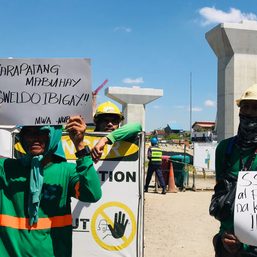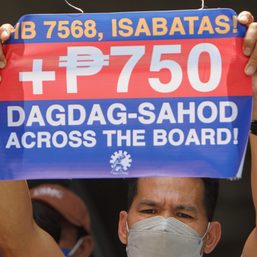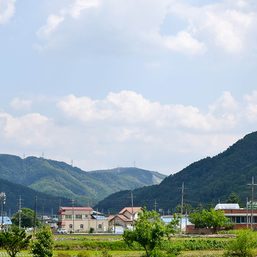SUMMARY
This is AI generated summarization, which may have errors. For context, always refer to the full article.
![[OPINION] Thoughts from a contractual teacher on the upcoming school year](https://www.rappler.com/tachyon/2020/07/teaching-during-pandemic-July-18-2020.jpg)
As much as I look forward to teach this school year, I might not – not by choice but by circumstance.
Yes, I wish I had the certainty to teach this upcoming school year but I don’t – not because I am less passionate towards teaching now, nor am I tired, but because I have been a contractual employee for 8 years now, with no tenure, and no assurance. As a contractual teacher, I can only hope there are enough students to guarantee me a teaching load. But hoping never resolved the issue. The issue is not me; the issue is systemic.
Contractualization penetrates even the academe, and it is sometimes frustrating how difficult it is to be a teacher in the Philippines. Hindi naman ako kulang sa sipag, lalong hindi ako kulang sa passion. But the situation of teachers in the Philippines constantly makes me feel like I am at a deficit, that maybe I am less, which is why I receive less.
I cannot help but remember the promise to end contractualization 4 years ago – what a lie that was.
This is not a rant against teaching per se, nor is it a pity party, but this is me recognizing that while I have loved teaching for 8 years, it has meant enduring all the that comes with it: job insecurity, a relatively lower salary than other professions, and sadly, even if teachers have proven time and time again how important we are in shaping social transformation, still being forgotten by a great number of people. My current situation speaks volumes about the struggles of teachers in the Philippines, but this is not merely about me; there is more to it.
Under the current health crisis, it is a dilemma to reconcile the importance of continuity of education vis-à-vis health security above all. The Department of Education released their Basic Education Learning Continuity Plan (BE-LCP) that lays the “framework” for the upcoming school year. It calls for the collaboration of teachers, and the utilization of ICT and digital connectivity in the delivery of learning, on top of adherence to health protocols imposed by the government.
I understand all of the attempts for the continuity of education. The question is, do they understand the long existing asymmetry in the availability of school facilities, of challenges in digital connectivity, and how disproportionately vulnerable other communities are during this pandemic? Data will attest that not all schools have enough ICT infrastructure to support the intensified utilization of technology-assisted delivery of education. Needless to say, the pre-existing challenges are brought about by distinct geographical factors. While some teachers have enough training and equipment for technology -assisted learning, someone somewhere has to problematize on consistent correspondence with their colleagues, parents, and students under enforced community quarantines that hinders their mobility, made even more challenging by struggles in digital connectivity.
Layer after layer of problems put pressure on our teachers. We know – we have to deliver. We owe our learners transformative education, but the government owes us too. It owes us transformation in the workplace, in infrastructure, in funding, and in labor security. We have always stretched our energy and our finances to be the teachers we promised this world. I hope the government could do the same for us.
But teachers do not monopolize the struggle. The learners are waiting. If the government meant what they said with “no learner left behind” as we transition to the new normal, they should guarantee that learners from poorer households are recognized and assisted respectively. Let us not wait for them to beg, because if that happens, then clearly the government has failed to deliver what it was made to do in the first place. When the government say “education for all” even during a pandemic, then education should encompass even indigenous people’s communities who are disproportionately more vulnerable to the inequalities that the pandemic has engendered. Lastly, when the government uses the slogan “we heal as one,” I hope they meant healing the pre-existing harsh conditions within which our teachers and learners operate.
The COVID-19 pandemic has impacted on education institutions, but the core of its impacts lies not solely on the threat of infection, but of the long existing problems in education that have constantly been overlooked. These problems have been acknowledged in words, but acknowledging these problems is one thing, and genuinely responding to them is another. The DepEd and CHED’s current direction if left unchecked will result in the widening of the already wide gap in education that cuts across social class, geography, and ethnicity, which has the potential to impact the economy and labor participation among Filipinos. The goal is to generate inequality-reducing transformations, not the opposite.
In retrospect, these problems are not new. We have heard this everywhere, the pandemic just made it glaring that teachers like myself, learners from diverse social background, and other vulnerable sectors deserve more than what they have received.
So will I be teaching this school year? Still uncertain. Will the kids receive quality education? Still uncertain. Will other vulnerable sectors receive what they should? Still uncertain. Will the curve be flattened, not bent? Still very uncertain. There are many uncertainties under the current health crisis, but what is certain is that the government owes us service – eternally. – Rappler.com
Brian Walter James Yague Delos Reyes from Cagayan Valley is an aspiring academic, researcher, and a former faculty at Saint Louis University-Baguio City, and is currently unemployed. He has a degree in Social Sciences major in Social Anthropology from the University of the Philippines-Baguio.
Add a comment
How does this make you feel?


![[Episodes] Fairness to freelancers](https://www.rappler.com/tachyon/2024/02/Freelance-Writers-Guild-of-the-Philippines-rate-guide.jpg?resize=257%2C257&crop=217px%2C0px%2C720px%2C720px)


There are no comments yet. Add your comment to start the conversation.